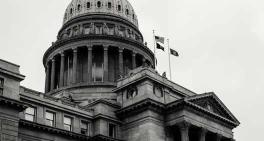Court: Constitutional ban on high fines applies to states
Supreme Court News
The Supreme Court ruled unanimously Wednesday that the Constitution's ban on excessive fines applies to the states, an outcome that could help efforts to rein in police seizure of property from criminal suspects.
Justice Ruth Bader Ginsburg wrote the court's opinion in favor of Tyson Timbs, of Marion, Indiana. Police seized Timbs' $40,000 Land Rover when they arrested him for selling about $400 worth of heroin.
Reading a summary of her opinion in the courtroom, Ginsburg noted that governments employ fines "out of accord with the penal goals of retribution and deterrence" because fines are a source of revenue. The 85-year-old justice missed arguments last month following lung cancer surgery, but returned to the bench on Tuesday.
Timbs pleaded guilty, but faced no prison time. The biggest loss was the Land Rover he bought with some of the life insurance money he received after his father died.
Timbs still has to win one more round in court before he gets his vehicle back, but that seems to be a formality. A judge ruled that taking the car was disproportionate to the severity of the crime, which carries a maximum fine of $10,000. But Indiana's top court said the justices had never ruled that the Eighth Amendment's ban on excessive fines — like much of the rest of the Bill of Rights — applies to states as well as the federal government.
The case drew interest from liberal groups concerned about police abuses and conservative organizations opposed to excessive regulation. Timbs was represented by the libertarian public interest law firm Institute for Justice.
"The decision is an important first step for curtailing the potential for abuse that we see in civil forfeiture nationwide," said Sam Gedge, a lawyer with the Institute for Justice.
Law enforcement authorities have dramatically increased their use of civil forfeiture in recent decades. When law enforcement seizes the property of people accused of crimes, the proceeds from its sale often go directly to the agency that took it, the law firm said in written arguments in support of Timbs.
Related listings
-
Court orders mediation in Maryland desegregation case
Supreme Court News 01/05/2019A federal appeals court has ordered a fourth attempt at mediation in a long-running dispute over the state of Maryland’s treatment of its historically black colleges.The black colleges say the state has underfunded them while developing program...
-
Court could deal blow to porn star, award Trump legal fees
Supreme Court News 12/04/2018Lawyers for President Trump want porn actress Stormy Daniels to pay them $340,000 in legal bills they claim they earned successfully defending Trump against her frivolous defamation claim.The attorneys are due in a Los Angeles federal courtroom Monda...
-
Supreme Court: Ross can't be questioned in census suit
Supreme Court News 10/22/2018The Supreme Court is siding with the Trump administration to block the questioning of Commerce Secretary Wilbur Ross about his decision to add a citizenship question to the 2020 census.The unsigned order Monday overrides lower federal courts in New Y...

Can my trucking injury case be filed in Illinois?
If you have been injured in a truck driving accident, you may be wondering whether your worker’s comp case can be filed in Illinois. For an injured truck driver, this is an important question to ask, as the jurisdiction of the case can end up having a big impact on your benefits.
There are three main scenarios in which the Illinois Worker’s Compensation Commission would have jurisdiction over a trucking injury:
-If the accident took place in Illinois, If the employer is principally located in Illinois, or If the contract for hire is in Illinois
This means that a truck driver whose home terminal is in Illinois can make a claim for workers comp benefits in Illinois even if they were injured while on the road in another State. It also means that truck drivers who get hurt while passing through Illinois can file a claim in Illinois, even if their employer is located in another state.
If you have been injured on the road, and you are unsure where and how to file your workers comp claim, call us at (312)-726-5567 to begin your consultation. We can advise you whether Illinois is the right state to file for you. We have handled well over 30,000 claims for injured workers throughout the state of Illinois.




